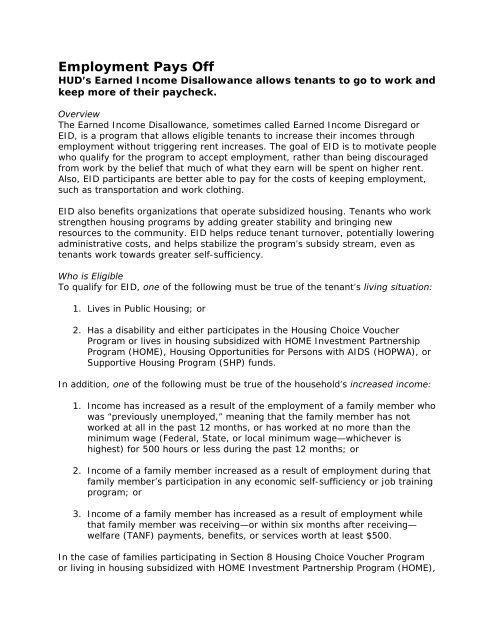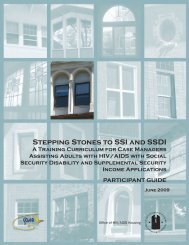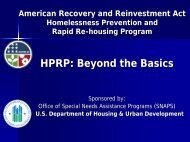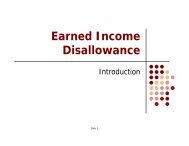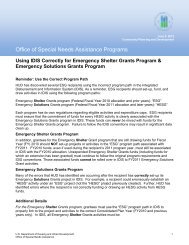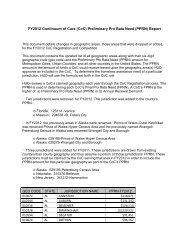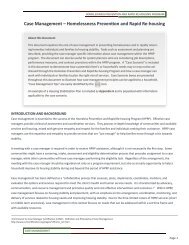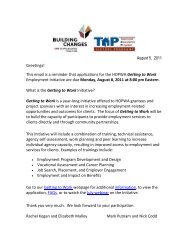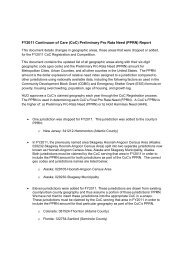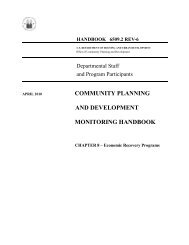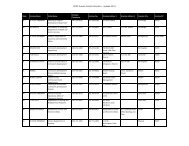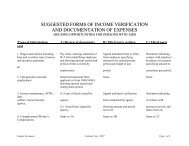EID Brochure Overview - OneCPD
EID Brochure Overview - OneCPD
EID Brochure Overview - OneCPD
You also want an ePaper? Increase the reach of your titles
YUMPU automatically turns print PDFs into web optimized ePapers that Google loves.
Employment Pays Off<br />
HUD’s Earned Income Disallowance allows tenants to go to work and<br />
keep more of their paycheck.<br />
<strong>Overview</strong><br />
The Earned Income Disallowance, sometimes called Earned Income Disregard or <br />
<strong>EID</strong>, is a program that allows eligible tenants to increase their incomes through <br />
employment without triggering rent increases. The goal of <strong>EID</strong> is to motivate people<br />
who qualify for the program to accept employment, rather than being discouraged <br />
from work by the belief that much of what they earn will be spent on higher rent. <br />
Also, <strong>EID</strong> participants are better able to pay for the costs of keeping employment, <br />
such as transportation and work clothing.<br />
<strong>EID</strong> also benefits organizations that operate subsidized housing. Tenants who work <br />
strengthen housing programs by adding greater stability and bringing new<br />
resources to the community. <strong>EID</strong> helps reduce tenant turnover, potentially lowering<br />
administrative costs, and helps stabilize the program’s subsidy stream, even as<br />
tenants work towards greater self-sufficiency. <br />
Who is Eligible<br />
To qualify for <strong>EID</strong>, one of the following must be true of the tenant’s living situation: <br />
1. Lives in Public Housing; or<br />
2. Has a disability and either participates in the Housing Choice Voucher<br />
Program or lives in housing subsidized with HOME Investment Partnership<br />
Program (HOME), Housing Opportunities for Persons with AIDS (HOPWA), or<br />
Supportive Housing Program (SHP) funds.<br />
In addition, one of the following must be true of the household’s increased income:<br />
1. Income has increased as a result of the employment of a family member who<br />
was “previously unemployed,” meaning that the family member has not<br />
worked at all in the past 12 months, or has worked at no more than the<br />
minimum wage (Federal, State, or local minimum wage—whichever is<br />
highest) for 500 hours or less during the past 12 months; or<br />
2. Income of a family member increased as a result of employment during that<br />
family member’s participation in any economic self-sufficiency or job training<br />
program; or<br />
3. Income of a family member has increased as a result of employment while<br />
that family member was receiving—or within six months after receiving—<br />
welfare (TANF) payments, benefits, or services worth at least $500.<br />
In the case of families participating in Section 8 Housing Choice Voucher Program<br />
or living in housing subsidized with HOME Investment Partnership Program (HOME),
Housing Opportunities for Persons with AIDS (HOPWA), or Supportive Housing<br />
Program (SHP) funds, an adult family member having a disability must meet one of<br />
the three income criteria above.<br />
Disability Defined<br />
Under the HUD and Social Security Administration definitions of disability, a person<br />
must, generally speaking, have a physical, mental or emotional impairment that:<br />
• is expected to be of long, continued, and indefinite duration;<br />
• substantially impedes his or her ability to live independently; and<br />
• is of such a nature that the person’s ability to live independently could be<br />
improved by more suitable housing conditions.<br />
Among the people meeting this definition would be a person who has a<br />
developmental disability and/or a chronic mental illness that seriously limits his or<br />
her ability to live independently and which could be improved by more suitable<br />
housing conditions.<br />
Time Limits<br />
<strong>EID</strong> may be used for a total of 24 months, but a tenant can receive the benefit over<br />
a 48-month period. The 48-month period begins on the date when the family<br />
member first begins employment and can stop and start along with employment.<br />
For example, a person could start and maintain employment for three months, and<br />
use <strong>EID</strong>, then stop working. If he or she began working again within 48 months of<br />
the first use of <strong>EID</strong>, he or she would be able to use <strong>EID</strong> to fully disregard up to nine<br />
more months of employment income.<br />
How to Calculate <strong>EID</strong><br />
The exact <strong>EID</strong> benefit amount depends on the tenant’s income. Starting from the<br />
base income prior to employment, 100% of any increase in income from work will<br />
be ignored for up to 12 months, and rent will not increase. After those 12 months<br />
have been used, up to 50% of an income increase from work will be ignored for<br />
another 12 months. The benefit starts and stops along with income from<br />
employment.<br />
For families that qualify for <strong>EID</strong> because a family member with a disability has<br />
gained employment, only the earnings of the individual with disabilities are<br />
excluded from calculating annual income.<br />
Example<br />
• Monthly SSI Income is $590.<br />
• After disability-related adjustments, monthly income counted is $520.<br />
• $520 x 30 percent (maximum allowed by HUD) = rent payment of $156 per<br />
month.<br />
• Tenant gets a job earning $1,000 per month.<br />
• For the first 12 months, this income is “disallowed” and rent does not go up.
• For months 13 through 24, 50 percent of $1,000 ($500) is “disallowed” and<br />
the other 50 percent is counted towards income, for a total income of<br />
$1,020.<br />
• Rent is then adjusted, for a monthly payment of $306 (30 percent of <br />
$1,020). <br />
For More Information<br />
If you are unsure if your housing is subsidized with HOME, HOPWA, or SHP funds,<br />
or if you want more information, contact the financial manager or executive director<br />
of your organization. For more brochures or a poster, contact Community<br />
Connections at 1-800-998-9999 and request that copies be sent to you. An indepth<br />
training module is available online at www.hudhre.info


